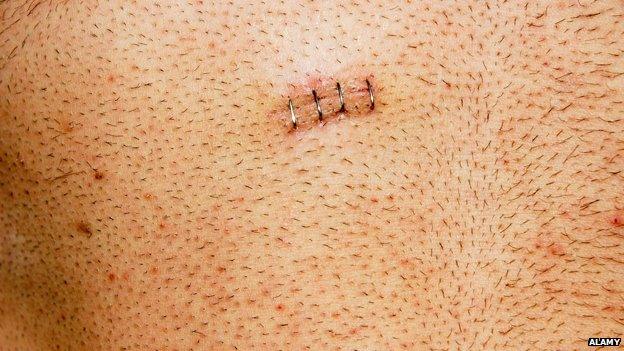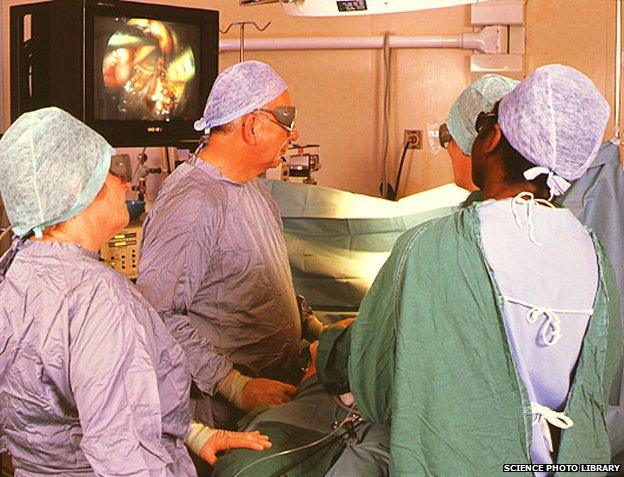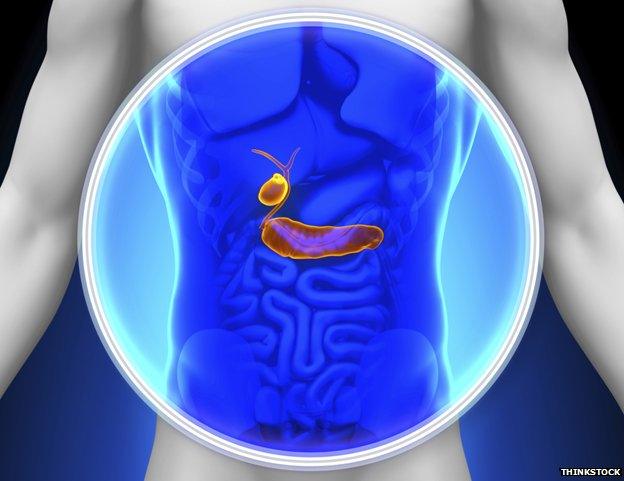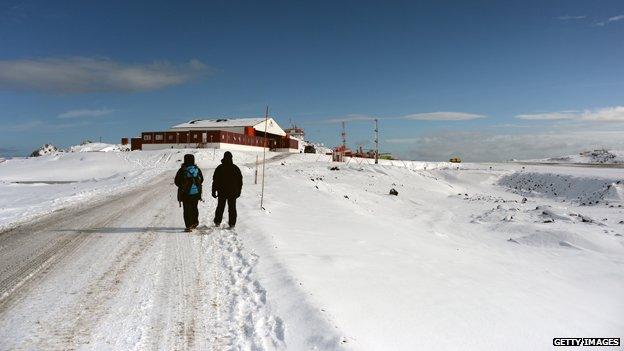Me and my 'useless' gall bladder
- Published

Hardly any trace - an operation scar 24 hours after gall bladder removal
After an operation to remove his gall bladder, playwright Mark Ravenhill discovered it was a "useless" organ. So how much more of the body could we live without?
That first night in Warsaw two years ago I suffered a huge pressure beneath my breast bone that wouldn't go away. I shifted position in the bed, walked up and down the room, tried to breathe as deeply as I could. But still an invisible fist was pushing in to my chest. I grunted and groaned, unable to sleep. It was, I guessed, severe indigestion.
The next day I was teaching a group of young Polish playwrights. The pain had passed but I'd had about 45 minutes' sleep. So I was a little slow in thought and speech but pleased to be past the pain and looking forward to a week of working with the rising talents of Polish theatre.
But that night in my hotel room the pain came just as sharply again and returned, an unwelcome visitor, night after night all week. That deep constant punch, maybe softening for a few minutes, sometimes enough to doze, but always returning with the same merciless insistence.
Inexplicably but thankfully the days were always pain-free. But as the week wore on I was teaching in a state of almost hallucinogenic sleep deprivation and had given up eating altogether, hoping that without food there could be no indigestion.
My last morning in Warsaw yellow eye balls stared back at me from the mirror in the bathroom. And I could detect the beginnings of a yellowing of the skin across my whole body. My urine was almost brown, my stools bordering on chalky white. I was jaundiced.
A brief search on Google convinced me that I now needed to upgrade my self-diagnosis from indigestion to an advanced cancer. A driver came to pick me up at the Warsaw hotel. Did he notice my progressive yellowness I wondered? I watched him closely but couldn't tell. As we drove the snow began to fall. Not a half-hearted sleet but great thick clumps of white until, as we reached the airport, it was a blizzard - stick your hand out to the full length of your arm and you wouldn't be able to see it any more.
Rushing to the check-in desk, I asked timidly (and thinking that I might now have to admit myself to a Warsaw hospital), "Is there any chance that the plane will fly?"
The woman from the Polish airline snorted, probably having heard tales of English airports closed at the first light dusting of snow. "Of course plane will fly."
Landing at Heathrow I asked a cab to take me straight to A&E.
"It's a gallstone," the junior doctor told me.
"So not cancer?"
"Oh no definitely not cancer. We'll send you up to the ward now and in the morning they'll remove the gallstone from your pancreas. You should be out by lunchtime."
"Good morning I'm your surgeon," said the surgeon the next day. "I'll be seeing to the gallstone and while we're in there we'll take out the gall bladder. Once one stone has got out and into the rest of your body it's likely to happen again. Might as well make sure it doesn't."
Lose my gall bladder? Will I be able to lead a normal life?

An operation to remove a gall bladder
"Oh yes. The gall bladder's completely useless. If it's going to be a problem, best just to take it out. I'll see you later. You won't see me. General anaesthetic."
I reached to Google "gall" and "gall bladder" but found my smartphone's battery had died. Could it really be that the gall bladder is unnecessary?
Wasn't gall once thought to be an essential human fluid? Wasn't it - I tried to remember a distant university lecture about Tillyard and the Elizabethan world view - wasn't it one of the humours? Yes it was. Blood, phlegm, gall and - um - something else were once thought to be the four fluids that moved about the body and whose equilibrium was essential for both bodily and mental health.
O the tragic fall of the gall bladder! Only a few centuries ago, responsible for pumping one of the four essential humours around the body. Now whipped out in a short session of keyhole surgery and - I'd guess - incinerated somewhere round the back of the hospital.

The four humours

Belief which dominated Western medicine from Hippocrates in ancient Greece, to the 19th Century, that human characteristics were determined by four distinct bodily fluids, or humours, in the body
Four humours were black bile, yellow bile, phlegm, and blood, each corresponding to a particular temperament, and to a specific "element" (earth, fire, water and air)
Yellow bile or "choler" was thought to make people angry; black bile was associated with melancholy; phlegm made people thoughtful (hence "phlegmatic") and blood made people brave (or sanguine)

Preparing for this essay I arranged to meet Andrew Jenkinson, a surgeon at London's UCH hospital. He'd offered to let me in to his operating theatre to watch the removal of a gall bladder. I was relieved when he texted me early that morning to say that the gall bladder surgery had been delayed until another day.
An emergency case had presented itself. A patient who'd had a gastric band fitted some months before had suffered a serious complication. The band had become twisted and she'd moved in the course of a year from being obese to dangerously underweight and had been rushed to the top of the operating list. So no operation that would be suitable for me to watch.
At the end of his working day, I met Jenkinson in UCH's cafeteria. As he chewed on a nicotine gum - "want one?" he offered - he scribbled out a diagram for me, explaining the workings of the digestive system and the gall bladder's part in it. First he sketched the stomach. I was surprised to be reminded how high up it sat in the body, some way above where I would locate my belly - and then the liver, surprisingly big, and beneath it, like a little deflated balloon, the gall bladder.
The body produces gall - or bile as we now call it - in order to break down fatty food in the stomach. The gall bladder doesn't produce the bile itself (it comes from the liver) but acts as a pump. Eat an extra large cheesy pizza, say, and the body needs a sudden rush of bile to the stomach. So the gall bladder kicks in and rushes the bile to the stomach to break down the quattro formaggio. But the bile can crystallise inside the gall bladder, creating gall stones. They can cause discomfort if they remain inside the gall bladder but if they get out they can form blockages in the liver or, as in my case, the pancreas. Then it all gets very nasty.

The gall bladder is the small yellow organ above the pancreas
So am I now less able to break down fats than I was when I had a gall bladder? "There's some evidence that very few patients suffer diarrhoea after gall bladder removal," Jenkinson told me. "Their bodies can't break down fat as efficiently. But it's very rare."
Then why have such an expendable body part, I asked. I thought that evolution had ensured that we had efficient, almost utilitarian bodies. But, Jenkinson told me, human civilisation has moved much faster than the pace of evolution. We haven't - on a digestive level - caught up with the beginnings of human farming, tens of thousands of years ago. Our digestive system is still that of a hunter-gatherer.
The hunter-gatherer, Jenkinson explained, didn't eat the more or less constant stream of food that we do. Feast or famine was the general rule. Maybe once a week a bison might be speared. And then huge quantities of protein and fat would be consumed very quickly, with the emergency pumping action of the gall bladder really coming in to play.
A fruit feast might come along a few days later but there'd be another sizeable gap before the body needed to break down huge amounts of fat and store it as energy.
So if medical technology advanced to the stage where we could push a button and delete the gall bladder, would Jenkinson recommend that everyone should have their gall bladder removed? "If we could be sure that there'd be no complications," he said, "yes."
Warming to his theme, Jenkinson pulled the piece of paper on which he'd sketched the human digestive system for me, back to his side of the table. He marked a cross through the gall bladder and began to draw over his initial sketch of the stomach. "In fact," he said, "we hardly need the stomach either. We've got stomachs that are far too large, that are meant to be full very rarely. But now that we're not hunter-gatherers, the problem is that we can get access to food constantly. We fill the stomach far more often than we should."

Prehistoric cave paintings - our bodies are still those of hunter-gatherers
I shifted uncomfortably in my seat, aware that I've achieved what I'd call a middle-aged spread but which a doctor is more likely to label as borderline obesity. Jenkinson was wiry - probably about my age but with the body of a swimmer or cyclist and clearly someone who practises what he preaches. There aren't any excess calories going into that body, I thought ruefully and promised myself to instantly begin a diet and exercise regime.
Jenkinson pushed the piece of paper back across the table to me. "With our contemporary access to food," he said. "We only need about 10% of the stomach's capacity." I looked down. He'd drawn a dotted line to create a thin tube of a stomach, cut free from the redundant 90%, our hangover from hunter-gatherer days.
I looked across the table at Jenkinson. I detected an excitement in his eyes and imagined I saw in him an almost evangelical thrill at the possibility that the human being need no longer be stuck with a pre-agricultural body in a post-industrial age, that we can modify and remove until we have a body that's fit for the age we live in.
Clearly the technology is at a crude stage - Jenkinson had spent the better part of his day sorting out a gastric band that had led to terrible complications. But we probably aren't that far off the point where we can press "delete" and lose 90% of our stomachs. Middle-age spread or borderline obesity will no longer be an issue.
And I have to say I haven't missed my gall bladder. If I'd been asked before it went, I'd have said that all of my body was an essential part of who I am. Well, maybe not the body fat that I'm constantly trying to lose. That's an unwelcome alien who's laid claim to my naturally slim body.
But I still feel as though the hair on my head is an essential part of me - even though that was lost some 20 years ago to male-pattern baldness. It's a strange and shifting thing - this sense that I have that I am my body, of which bits are essential and which expendable.
I still have my tonsils. I was just a little too young to undergo the almost automatic removal that was considered essential for the generation before me. I was born in a nominally Church of England household so I held on to my foreskin. Although my appendix was removed when I was less than a year old and I can't say I've ever missed it.
Bits of the body lost or not lost, depending on culture, history, chance. My body - I realise - is not the stable thing I thought it was.

The Antarctic: Appendectomies are compulsory for explorers from several countries
Since 1950 Australian explorers of the Antarctic have had to have their appendixes removed before their missions, to ensure that the explorer doesn't suffer appendicitis far away from a surgeon. Similar prophylactic appendectomy has been fairly common but not mandatory practice for Russian, UK, French, Chilean and Argentinean explorers of the Antarctic.
In 2012, the Canadian Journal of Surgery published an article co-authored by a team of surgeons. With longer and longer space journeys planned - a colony on the moon and a manned mission to Mars are now no longer just the stuff of science fiction - should astronauts undergo prophylactic surgical procedures before leaving Earth's atmosphere? That is, should they have any unnecessary bits of them cut out just in case they cause medical complications far out in space?
The report concludes (as cautiously as you would expect from a group of Canadian surgeons): "As a result of the immense potential risk for loss of mission and/or human life… prophylactic surgical removal of a crew member's healthy appendix should be considered. This may also apply to a healthy gallbladder… the presence of gallstones clearly represents the greatest threat... the ease and safety of surgical prophylaxis currently appears to outweigh the logistics of treating either acute appendicitis or cholecystitis during extended-duration space flight."
So on balance it's better for the astronaut to have their appendix and gall bladder removed - just in case. Could this one day soon be all of us?
I spoke recently to a friend in the US who is considering a prophylactic double mastectomy. She's had no indications of any breast cancer but thinks that after passing 50 years of age and with a family history of breast cancer, it's better to be breastless. She has several female friends who've already had the same procedure.
I nodded my support for her decision, suppressing my instinct to say, "But aren't your breasts an essential part of you, your womanhood, your beauty? Can you really just decide to let them go without the arrival of cancer?"
"They're no use to me now," she said with a sad smile. "Might as well take them off for safety's sake."

It's relatively easy to have the gall bladder or appendix removed - they've long since ceased to have any symbolic or cultural significance for us. But as medical technology becomes more sophisticated, we're going to face difficult questions. Which parts of ourselves are medically, psychologically, emotionally necessary? Am I my body? And how much of it do I want or need?
Mark Ravenhill writes and presents The Gall Bladder at 22:45 BST on BBC Radio 3 on Monday 13 October, as part of A Body of Essays, a series of writers' reflections on various organs of the human body - or catch up on BBC iPlayer
Subscribe to the BBC News Magazine's email newsletter to get articles sent to your inbox.